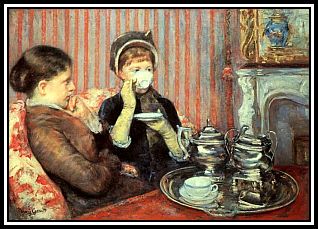TALES OF MY FATHER
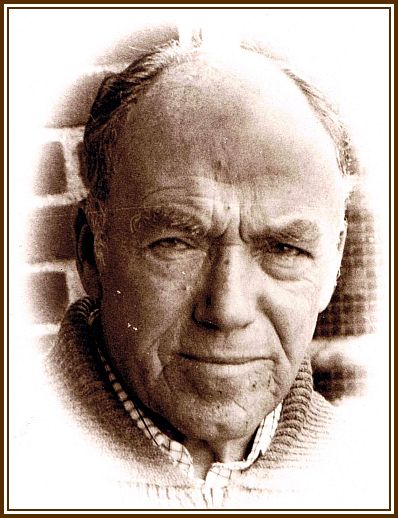 My Father ……. Jack-of-all-Trades, Master-of-None ……. an enigma
My Father ……. Jack-of-all-Trades, Master-of-None ……. an enigma
-oOo-
TALE FIVE: HOW TO MAKE
THE PERFECT CUP OF TEA
-oOo-
-oOo-
To say that I father enjoyed tea would be an understatement. And to say that my father loved a cup of tea would not do credit to the joy and pleasure that he gained from drinking the beverage. My father relished his cup of tea and never tired of drinking cup after cup throughout the day. However, the drink had to be prepared to his strict specifications! Any offering that did not meet his standards was met with insults and the person responsible in turn suffered his wrath.
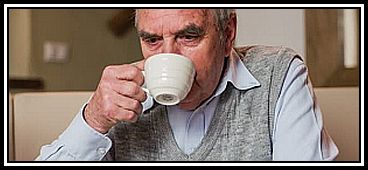
-oOo-
I remember, as a child, I suffered this wrath on many occasions. When I was on school holidays and was at home in the afternoons, I was generally asked to make a cup of tea for my parents. My parents had worked hard in the Pie ‘n’ Mash Shop filling orders for the lunchtime rush. Once the Shop had closed, they enjoyed a cup of tea while they prepared the Shop for the evening séance. Normally when I was at school, my father would take time to prepared the drink himself, but when I was at home, this job feel to me.
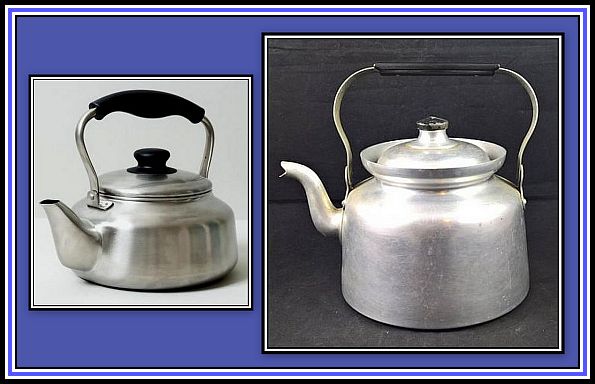
I dreaded making tea for my father. Although he had tutored me in the correct way to prepare a cup of tea, I was never able to produce the beverage to his satisfaction. I have to admit that I did take short-cuts, which caused the flavour of the product to not be too his liking. My major fault lay in the old proverb, a watched pot never boils! I would fill the kettle with cold water and then put it on the gas stove to heat. It seemed to take an age for the water to reach a boil and I was guilty of taking the water off the stove once I saw the first bubbles appear. Of course, these first bubbles do not mean that the water has reached boiling point. As a result, the tea did not taste as my father would want.
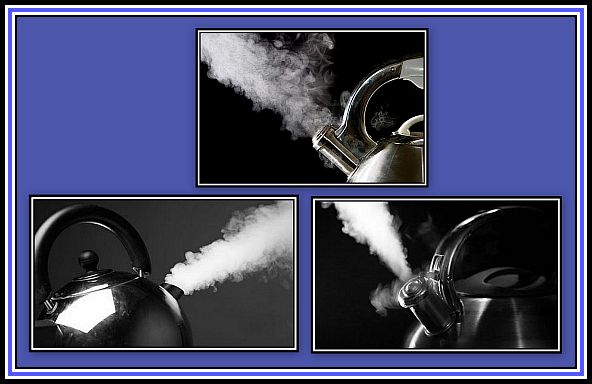 Water needs to be brought to the boil for the making of Tea
Water needs to be brought to the boil for the making of Tea
My father rewarded my efforts with descriptive terms such as What is this gnat’s piss? Tea? You call this Tea? I suffered verbal abuse, not physical abuse, and actually could not blame my father for his responses, since even then, I realised that I deserved his scorn. My mother always came to my defense and told my father that if he did not like my tea then he ought to make it himself. Of course my mother was not overly impressed with my effort, but she was much less harsh in her critique!
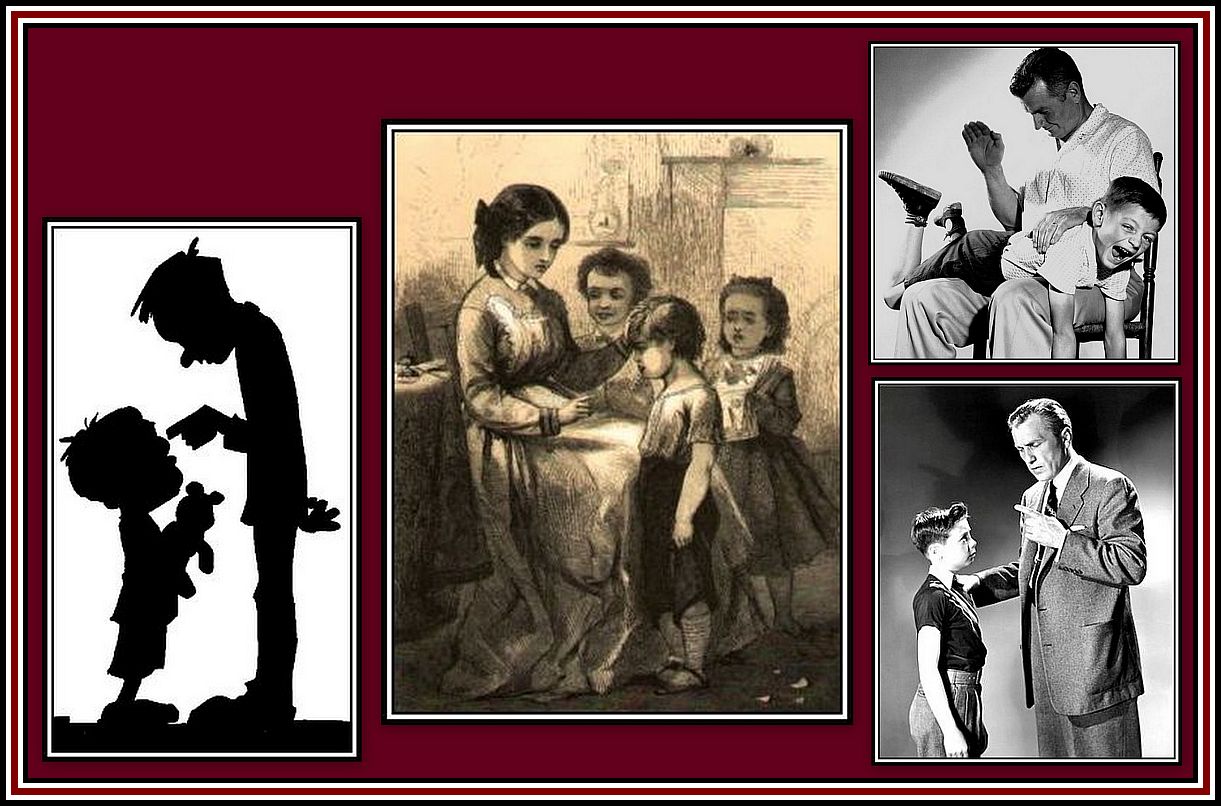
-oOo-
Upon reflection, I have now to agree with my father regarding my efforts at tea making. Over the years, I have learned to make a decent cup of tea that I believe my father would accept without insult. Today, I have solved the problem of receiving poor quality tea that is now served in many establishments in most of London and South East England and in the U.S. I have solved it by drinking coffee (which is much improved in the U.K. of late!)
-oOo-
ADVENTURES WITH MY FATHER ……. ORDERING TEA
Although I often suffered the wrath of my father as a result of my tea making, I fear that I was not alone in receiving his insults. Over the years, my father insulted a number of people for a variety of reasons, most of which cause me to laugh now, but, at the time, brought my mother and me acute embarrassment.
-oOo-
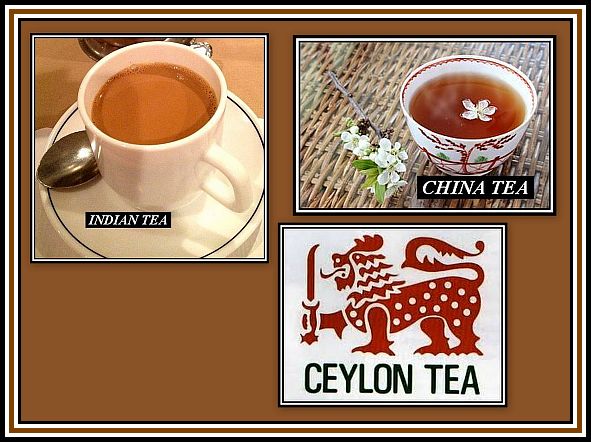
My father liked Indian and Ceylon Tea. He did not care for China Tea and dismissed it as being too weak. He complained that it was not strong enough for his taste. He liked very strong tea. Tea that was, even with a little milk, the colour of mud!
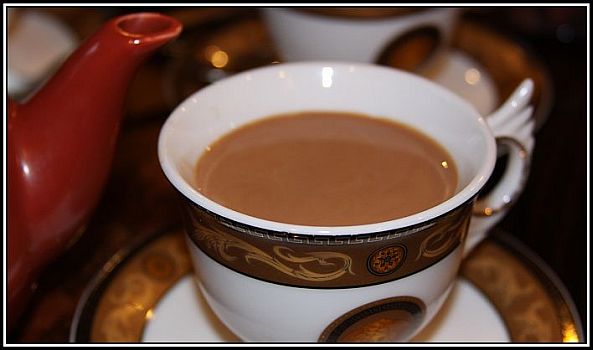 Almost The Preferred Colour of My Father’s Tea – still a tad weak for him!
Almost The Preferred Colour of My Father’s Tea – still a tad weak for him!
-oOo-
My mother and I dreaded going into certain establishments with my father for a cup of tea, as often as not, the liquid that was presented to us failed miserably to meet his standards.
What follows next is a few examples, and by no means all, of some of his more memorable interactions, and which are presented here purely for the amusement of the reader.
-oOo-

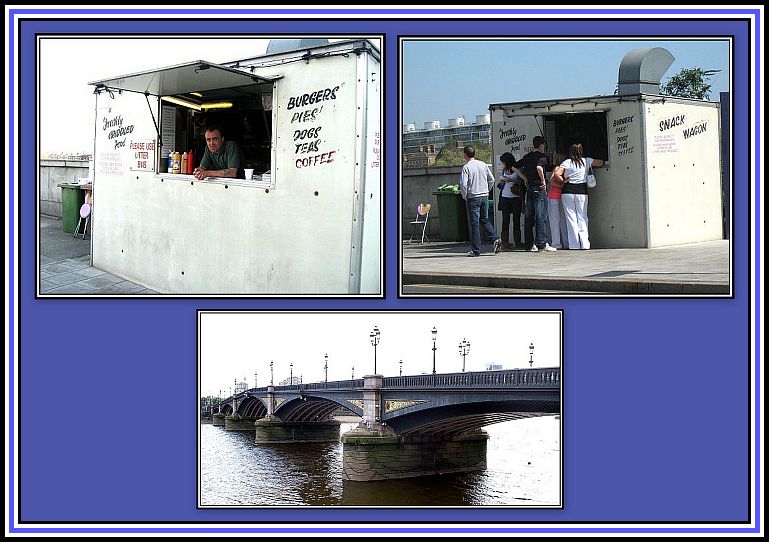 One of the few remaining Tea Stalls left in London
One of the few remaining Tea Stalls left in London
This stall is present on Battersea Bridge and is seen here in 2009
The photograph of The Bridge was taken by Iridescent
My father was extremely particular where he ordered a cup of tea. His venue of choice was from a stall that used to dot London at one time. However ordering in a café or a restaurant was another story. Cafés in the East End and South London generally made tea strong enough for him, stalls, but those in the West End produced brews that were not generally, to say the least, to his taste.
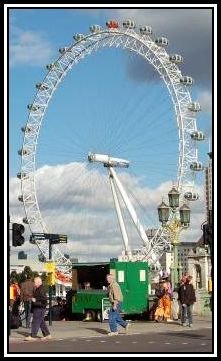 A Former Tea Stall at the North East Corner of Westminster Bridge
A Former Tea Stall at the North East Corner of Westminster Bridge
-oOo-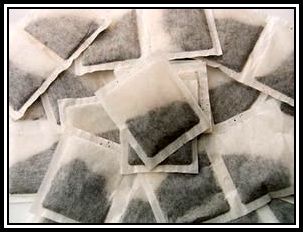 Tea Bags
Tea Bags
I remember when Tea Bags first came into common usage. We were in Kensington for some long forgotten reason when my father decided that we needed a cup of tea. We went into a café and sat down amongst the potted plants and fresco-decorated walls. I should have guessed that this was going to be one of those times where the intolerant side of my father was going to show.
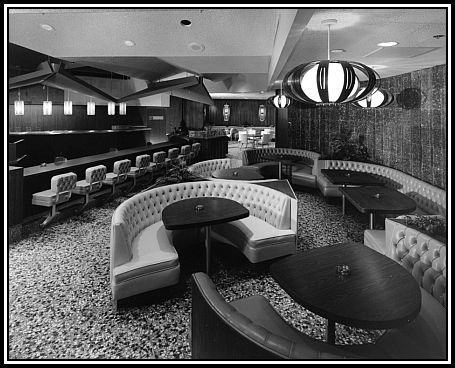 An Example of a Cafe during the late 1950s and early 1960s
An Example of a Cafe during the late 1950s and early 1960s
-oOo-
A young girl with little English came to the table and asked what we wanted to drink. My father ordered cups of tea for my mother, me and himself. It took an age for her to return, which annoyed my father. He liked simple cafés where there was always a huge pot of tea available for pouring together with another waiting for serving.
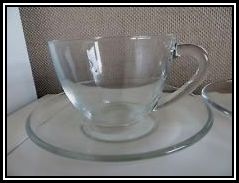 A Clear Pyrex Cup & Saucer
A Clear Pyrex Cup & Saucer
When the girl arrived with her tray, she began placing a clear Pyrex cup of tepid water and saucer with a slice of lemon on the side in front of each of us. She then proceeded to place a small Pyrex plate in the centre of the table with three small Tea Bags on it.
-oOo-
DIGRESSION: Allow me to state that my father was very, very particular about the vessel he drank his tea from and, believe it or not, spent much of his life in search of the perfect cup. He was never able to pass a shop or store where dish ware was sold in case his chalice of choice should be on sale there. Every holiday that we spent usually resulted in his bringing home a new cup or two, which would most certainly be discarded quickly along with the many others that he had bought. He not only searched for the perfect cup, but also the most enormous one too. As he worked in a hot bakehouse preparing pies and eels, he required a cup of gigantic size to contain sufficient liquid to quench his thirst. Such a cup was supposed to save him from constantly running up to the kitchen to refill smaller cups. Perhaps it did, but it only served to send him off to the toilet multiple times during the day!
-oOo-
After placing the cups, saucers and tea bags on our table, the girl turned and began to walk away. My father called her back and asked her what was this, as he pointed to the water. She was unsure what he meant and mumbled something. He then told her that water had to be boiling in order to make a decent cup of tea. Without waiting for her comment, he then asked her what were these Sacs that she had placed in the middle of the table. The girl stood there seemingly unable to speak or move. My father then launched into how to make a cup of tea. Without waiting for him to finish, the girl found her footing and ran off.
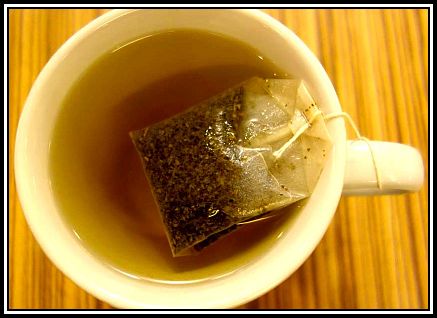 Weak Tea that would have horrified my Father
Weak Tea that would have horrified my Father
Not long after the manager came to our table and asked if he could help in any way. My father was ready for him! He again launched into what was required in order to produce a decent cup of tea. He said that tepid water did not make tea, but piss water. He said that tepid water might be fine for coffee, as he pointed to the Espresso Machine behind the counter, but that it was decidedly not hot enough to brew tea. He told the manager of the need to boil water, warm the teapot and use decent cups. He then turned his attention to the Sacs and complained that loose tea was necessary to brew a good cup of tea.
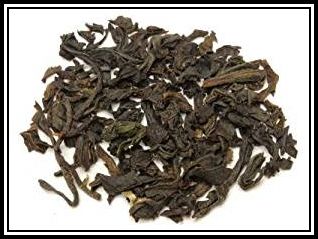 Loose Tea
Loose Tea
The manager stood there, and like the girl, seemed not to know what to say. I suspect that he had not understood a word that my father had said. My father did not do well when his speaking met with silence. Since the manager, like the girl before him, appeared to have become frozen to the spot, my father began to get more annoyed.
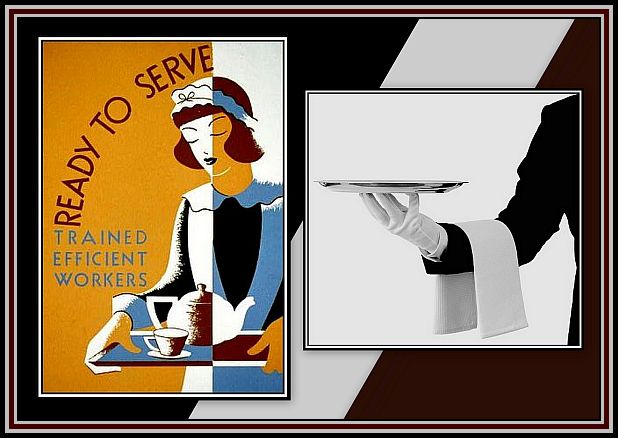
My mother and I were by now very embarrassed and knew that unless we got my father out of the establishment, the situation could only worsen. Once he got into such a mood there was no dealing with him. And so we stood and quickly made our way to the exit. My father continued to complain at the frozen and silent manager, and then realising that he was getting nowhere, decided to follow us, and made his way out while complaining loudly for the whole café to hear about the poor service he had received and that he would never frequent the place again, which I feel certain did not upset the management in the slightest!
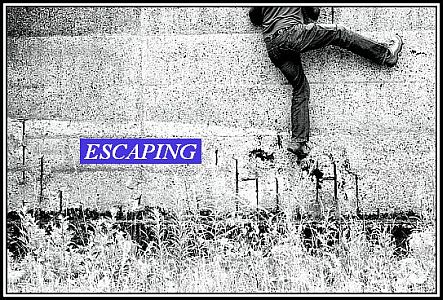
-oOo-
Both my mother and I were very happy to escape from the café. My mother suggested that we had best cut short whatever it was that we were doing in Kensington and return home. Fortunately we did not have to wait too long for a bus to arrive to take us back to the East End. As a result we did not have to listen to my father’s endless complaints about the café for too much longer. Luckily for us, in those days London double decker buses allowed passengers on the upper deck to smoke. This was a blessing, as my father went upstairs and we went and sat on the lower deck. My mother breathed a sigh of relief and said that he could moan and groan about his experience to strangers and was glad not to hear him bleat on further!
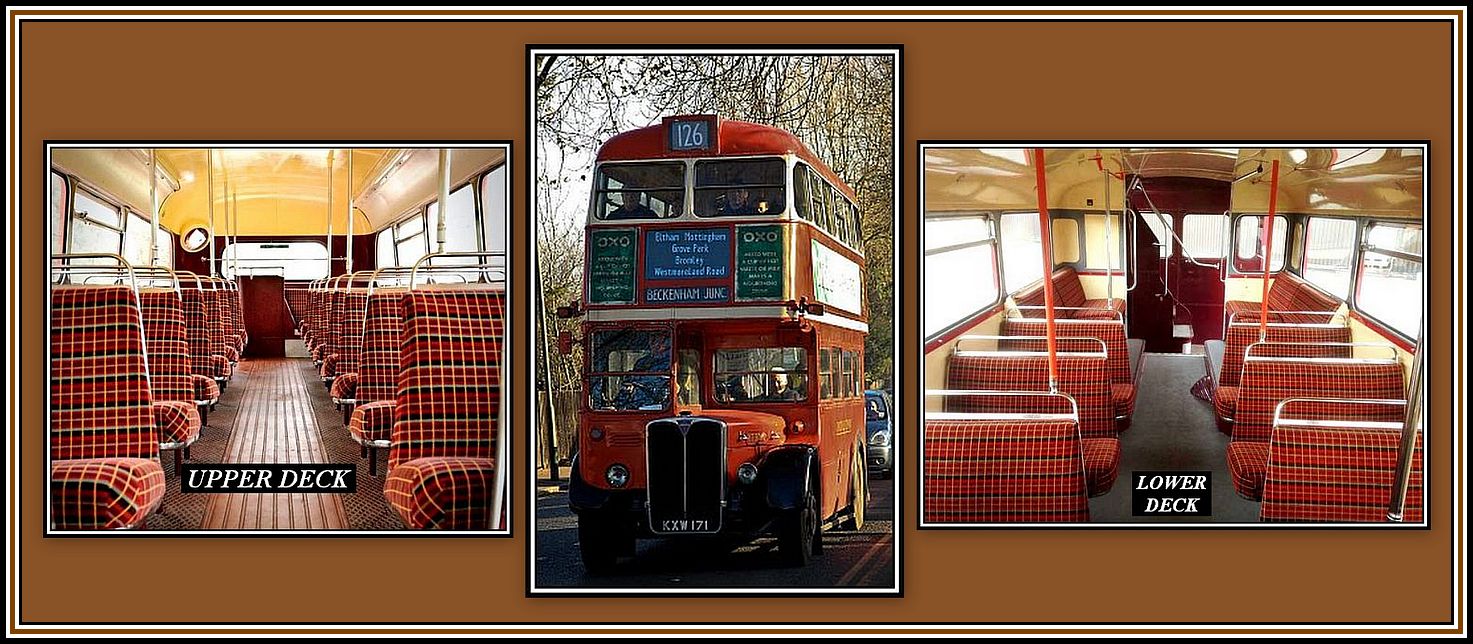 Type RT London Bus
Type RT London Bus
Once we got home, my father immediately began to make a cup of tea. This he did even before he took off his coat and hat. His mood did not improve until after he had drunk his first cup of tea. I have to admit that his drink was refreshing and helped us all perk up!
-oOo-

Another time, when my father showed us up, as Eastenders used to say, was during a visit to my Aunt Rose’s home in Russia Lane in Bethnal Green. At the time, Russia Lane had a bad reputation for housing petty crooks and some dangerous criminals. My mother hated going there and I had been given orders never to go to the area alone.
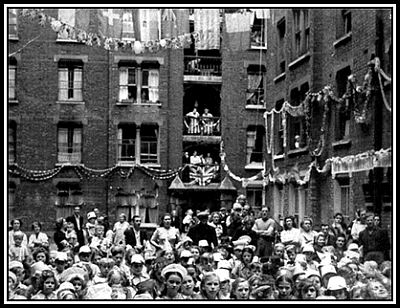 Flats in Quinn Square, Russia Lane at the time of The Coronation in 1953
Flats in Quinn Square, Russia Lane at the time of The Coronation in 1953
 Luxury Apartments of Russia Lane today
Luxury Apartments of Russia Lane today
-oOo-
Aunt Rose was a half-sister of my mother. She was a child of my grandmother’s second marriage and was about six years younger than my mother. Aunt Rose, who was known as Rosie, had been wild as a young girl and became pregnant at the age of sixteen and, as was the order of the day, was soon married. She had married a cousin and there seemed to have been a problem with the compatibility of their blood. Whatever the cause, each of their three children required blood transfusion immediately after birth. This was generally referred to as having their blood changed. When I was very young, and first heard of this problem, and was totally ignorant of the theory of blood transfusion, I was confused. I could not understand how all of the blood could be drained from the baby’s body and then new blood added. Whenever I asked about this, I was told to be quiet and not ask so many questions.
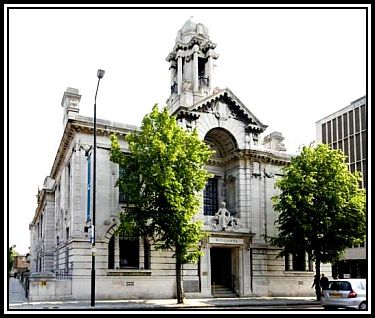 Bethnal Green Town Hall where Aunt Rosie was married
Bethnal Green Town Hall where Aunt Rosie was married
Auntie Rosie, as I called her, and her husband, whose name I have forgotten, lived with three children, which had been born over a three year period, in a very small flat in one of the buildings of Russia Lane. Her children were very young and were always dirty whenever I saw them. Needless to say, Auntie Rose was not a house-proud type of person and generally her flat was untidy and with unwashed dishes overflowing in the sink.
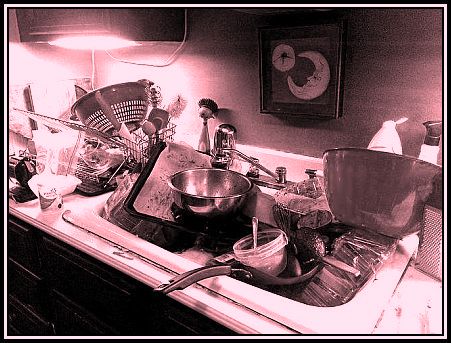
Although I cannot say that I disliked Auntie Rosie, I was not overly taken with her either. She was. from what I could tell, a pretty harmless soul, who was not perhaps the sharpest knife in the drawer! However, I did dislike her children who were all younger than me. I think that this dislike was based on their appearance and their behaviour during our visits since I never had much interaction with them other than having them poke their tongues out at me when they thought no adult was looking. In contrast to the kids, I did like her husband. He was a huge jolly man and was always kind to me and my mother. I am sure that much of my liking came from the fact that he always gave me money to spend and, for a joke, used to offer me cigarettes. I always took one when he offered me the open packet, causing him to roar with laughter. Whenever my mother did not see me accept a cigarette, I was never made to return the illicit fag to him. I got the impression that he was a crook of some description and believe that he either had been or was sent later to prison for a stretch.
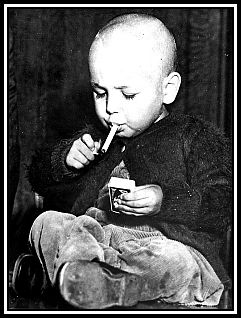
-oOo-
Although Auntie Rosie’s housekeeping abilities and her lack of pride in the appearance of her children were far from ideal, these failings paled in comparison with her total inability to make a halfway decent cup of tea! Actually it was pushing the definition of tea to call the liquid that she offered visitors. At that time, Tea Bags had not been devised and people made their brew by mixing some tea leaves with boiling water and allowing it to sit, brew or steep.
There is an old rule about making tea, which states that for a good cup of tea, one adds one scoop for each person and one for the pot! My father always added much, much more when making his tea needless to say while it is hard to believe that Auntie Rosie added barely one scoop for a whole teapot-full! She also never allowed the brew to sit or steep for any length of time, thereby producing a very weak drink. To make matters worse, she added to the cup a vast amount of milk and several heaped teaspoons-full of sugar. Following the preparation, she handed this white and sweet concoction to her guests.
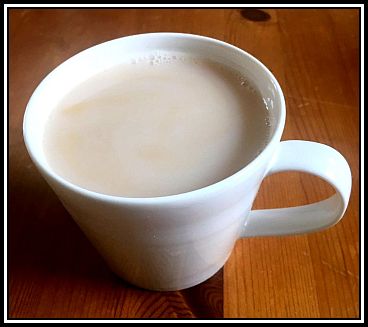 This is how Aunt Rosie’s Tea looked
This is how Aunt Rosie’s Tea looked
I could never drink more than a few sips of this foul drink, but my mother was able to force a cupful down, but always refused a second cup. Auntie Rosie was like my father in that she was able to devour cup after cup of this foul brew.
-oOo-
I cannot recall why my father came with us to visit Auntie Rosie. I have to confess that whatever his reasoning was for accompanying us still leaves me bewildered. The only reason that I could think of to account for his presence was that he had known Auntie Rose since she was a child and that he used to take her and her younger sisters, Louise (whom I called Lulu) and Marjorie (whom I called Margie) to the park, Anyway, prior to arriving at Auntie Rosie’s home, I remember my mother warning my father of her tea and her literally begging him not to accept a cup should she offer him one.
-oOo-
The door of her flat opened directly into the kitchen. Auntie Rosie greeted us with kisses. Her hair looked uncombed and her face showed signs of yesterday’s makeup. She wore a once-white blouse, torn black skirt and no shoes with two of her children clinging to her side. Their faces and clothes were dirty and the youngest who had evidently just learned to crawl was moving around the floor with a full nappie.

Auntie Rosie beckoned us into the kitchen, which was also a mess with dirty plates on the table and clothes piled on most of the chairs. She tipped the clothes onto the floor as she told us to sit down.
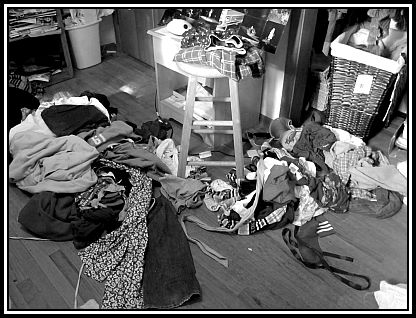
-oOo-
I will give Auntie Rosie credit for the fact that she was generally very friendly. She obviously liked my parents and chatted away eagerly to them. After a bit, it happened ……. she offered us a cup of tea. My father had evidently forgotten my mother’s warning and heartily accepted the offer. His joy soon left him as he watched her making the tea! His lack of joy quickly turned to horror when he was presented with a cup filled with a pale sickly liquid. After taking it the cup, he sat there just looking at it. I remember that both my mother and I held our breath and waited for the explosion to occur.
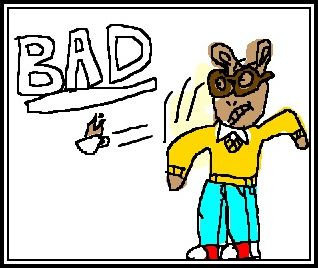
After what seemed like a thousand years, he looked up and asked my Aunt what was in the cup. Auntie Rosie, perhaps not the swiftest person in London, with a somewhat confused air, said tea. Of course, this brought forth a bellow from him ……. Tea? You call this piss tea? I am unsure what exactly happened next, but I do recall being scooped up by my mother while pushing my father around the children and out of the door. I heard my mother apologising for my father’s rudeness and him continuing to bellow about the brew and also telling my mother that he did not want anyone to apologise for his actions etc.

My father continued to moan and groan as we stumbled down the stone stairs of the building and out into the courtyard. I recall seeing Auntie Rosie standing on her tiny balcony amid all the washing that was hanging there and watching us leave. I am still unsure if she understood what had happened and did not know what caused my father to yelp and complain.
Needless to say that I have never seen either Auntie Rosie, her husband or her children since that faithful day and happily never again tasted her awful weak tea!
-oOo-
As embarrassing as The Kensington Event and Tea with Aunt Rosie were, they pale in comparison to the event that took place one July afternoon in Paris after I dared to suggest some refreshment during a visit to La Tour Eiffel.
-oOo-

It was in 1971 while I was living in Paris when my parents came to visit in the month of July. I have written about their visit in my book, Shiva Tales, where I discuss various events that befell them. One particular event took place at La Tour Eiffel. In the book, the events are centred around a man known as Mr. Greenberg, or as he was known to his friends, Mr. G. Mr. G was of course based on my father. A second event took place during my parents’ visit to La Tour Eiffel that was not included in the book. However the telling of this tale would seem to fit rather well here.
Following the désaccord recounted in Shiva Tales, I suggested that we have some refreshment in order to help calm my father who was still smarting from the interaction at the top of La Tour. However, as the reader will learn, what I should have suggested was that we took the lift down to ground level and then gone home for something to drink. As I said in the book, for some Paris is a dangerous town!

-oOo-
We went to the café-restaurant on the first floor of La Tour. It was late in the afternoon, and for us, a perfect time for a cup of tea. The French, I had learned to not stop for tea in the afternoon. I worked in a hospital laboratory at the time and noticed that the efficiency of the technicians dwindled down dramatically following their lunch. Those that accepted my offer of a cup of tea that I made in the laboratory, noted that they were able to work better afterwards. Anyway, when we walked into the café-restaurant, we were not greeted with smiles from the many garçons that stood chatting in a group in front of a counter. Evidently we were seen as an annoyance, an interruption to their conversions ……. un ennui!
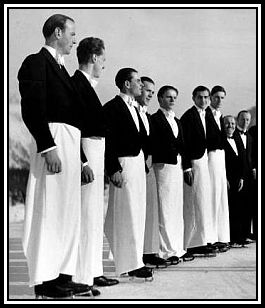
I chose a table beside a window and looked over at the garçons who were playing chicken and waiting for one to break and come over to see what we wanted. Eventually one broke and glided over. I asked for tea with milk. One had to inform waiters in France of the need to drink one’s tea with milk, as in most cases, tea means with lemon. Although lemon is a nice addition to tea, my father preferred, and demanded milk!
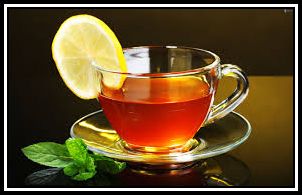
The waiter slid away and returned a few minutes later with three cups with slices of lemon in them. I told the waiter that we wanted milk with our tea and not lemon. He huffed and puffed at this and proceeded to scoop out the slices of lemon and dropped them with much flourish and irritation on his tray. I next told him that we needed fresh cups that had not had lemon in them since the acid from the citrous fruit would clot the milk. The waiter then began to complain and bemoaned the oddities of the English using some very displeasing and totally unnecessary words thinking that I did not follow.
-oOo-
What the waiter did not know was that after living in Paris for almost a year, I had suffered much rudeness from Parisians and had often found myself unable to respond to the nasty comments thrown at me on Le Metro or in a store. My spoken French prior to this event, as a French friend told me, was pure, without slang and with no swear words.
Now I am not someone who will suffer insults without a retort. I am my father’s son in spite of myself and respond in kind when I am pushed by a bully in a shop or elsewhere. Following my friend’s remark about my spoken French, I decided that I had to learn some choice terms to hurl back at some brute, beast or toad that insulted me in the street. It was suggested that I hire a university student to help me with my needs. The student, Dani, was an English student at the Sorbonne and a very nice young woman. Over the next three or four months, we met in a café on the Boulevard Saint Michel and I learned the joys of Argot and terms only sailors dare use.
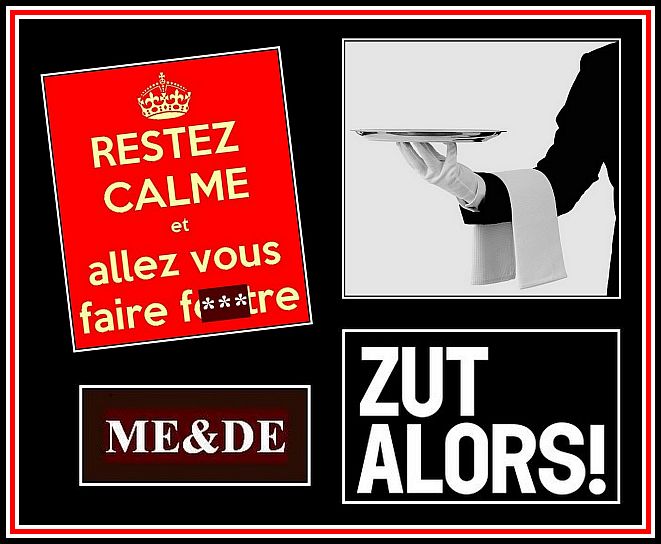
Dani’s lessons proved invaluable. She taught me terms of sarcasm, which she said that the English were masters of. I have always enjoyed sarcasm and have never believed it to be the lowest form of wit. I do not use sarcasm to be funny, but rather to sting those that needed stinging.
-oOo-
And so that waiter in the café-restaurant of La Tour Eiffel was treated to some terms that froze him to the stop for a minute or two. I ended my discourse by suggesting that he now return to the kitchen and PLEASE bring back some fresh cups sans citron! He quickly returned with fresh cups and also with little pots of tea and a jug of cream. He was miffed, but remained quiet, when I asked him for milk and not cream.
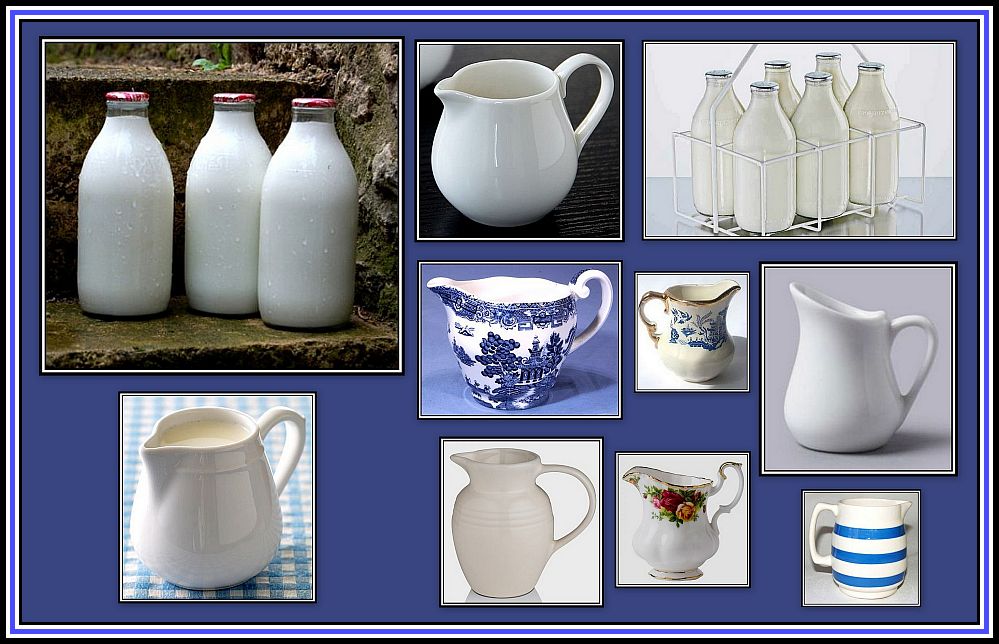
My parents wanted to know what had passed between the waiter and me. I always had to be careful with my father NOT to tell him everything when I had an interaction with another. He believed that it was ME who was unreasonable in such contre-temps. ME, who lacked patience. And ME who was to blame for any disagreement! My father never saw any resemblance between himself and me when it came to a question of our short tempers! So I told him that the waiter was tried and upset that he had to keep walking back and forth to the kitchen.
-oOo-
How I wished that I had not taken my parents to the cafe-restaurant of Le Tour Eiffel and had taken them down to ground level and gone elsewhere. My father began to unload his annoyance from the earlier event at the top of La Tour Eiffel and began to unleash it on a multitudes of things French that he disliked e.g. The French Army of The Second World War; the general dirtiness that he had found in France at that time; the women that were found in Men’s Lavatories who he was convinced enjoyed watching one urinate! and so on. My mother looked at me and we knew that we had to get him out of the café-restaurant before he exploded at the waiter.

However, it was too late. The tea turned out to be of the weak variety. My father rose up from his chair and carried his cup over to the grumbling waiters and proceeded to ask them if they called this bilge water, tea? The waiters stood there in silence. None dared to open their mouths evidently realising that my father was in no state to be reasoned with and possibly a madman.
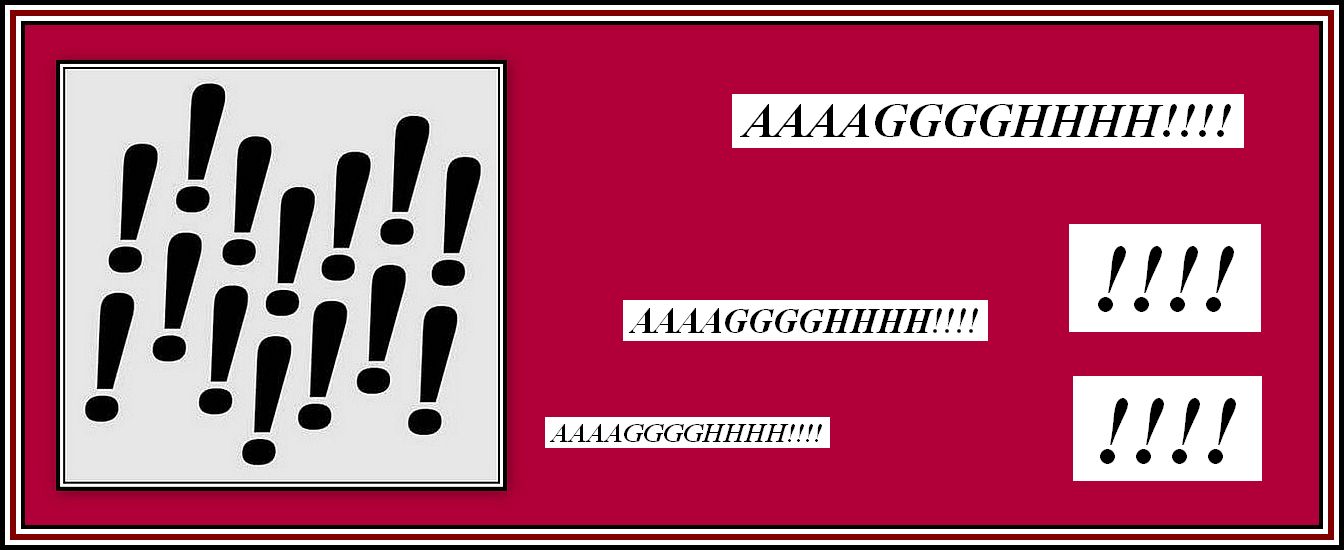
My mother and I had followed my father over to the counter and we now each took an arm and walked him out through the exit and made haste for the lift down, which, fortunately, had just arrived when we got there and through the open gate we strode.
My father complained throughout the short journey down. None of our fellow passengers seemed to dare to speak and I think were deep in prayer for the descent to be over. Once we exited the lift, I realised two things: my father was still holding his cup and that I had not paid L’addition!
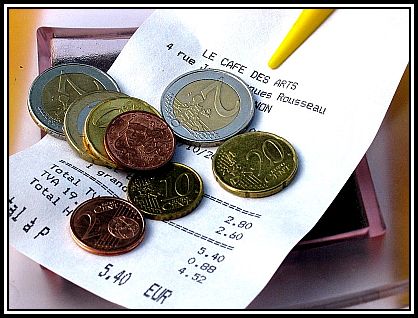
-oOo-
Later, once we were home and my father was sitting quietly and calmly drinking a cup of tea, which he said was not ideal since French water is not the best for making a good cup of tea, my mother told my father and me off. She said that we were both a disgrace. I had to smile at her rebuke since she was also not one to suffer fools and idiots well. She had the advantage over my father and me in that she was much quieter when making her complaint.
-oOo-
I learned a great deal from the event in the café-restaurant of La Tour Eiffel. In fact, I learned far more about myself than I wanted to know. My father’s annoyance at certain things had always been seen by me up to that point, as something embarrassing and later as something amusing, which had to be tolerated. His outbursts of temper were dismissed by me as just the way he is! That day I realised that I could …… and had ….. responded towards the waiter as my father had! It was then that it dawned on me …….. I was much more like my father in temperament than I would have liked. This realisation came as a great surprise ….. and was perhaps not a welcome one! But nevertheless, it was one that needed to be given careful thought.

-oOo-
Years later when my parents and I would recall past times and people, we generally laughed and enjoyed reliving them once more. However, when we recalled my father’s demands and behaviours when it came to the making of tea and mentioned his intolerance of others who did not know how to make a cup of tea just as he liked, it always proved to be a different matter. Whereas my mother and I would always laugh heartily at one of these escapades, alas, my father was never able to join us, and often began reliving the memory a fresh, which only served to laugh more and do so until we ached!
I am happy to say that despite the realisation that I could behave like my father in certain situations, fortunately I am able to laugh at myself, especially over such an event as described here.
—ooOoo—
-oOo-

